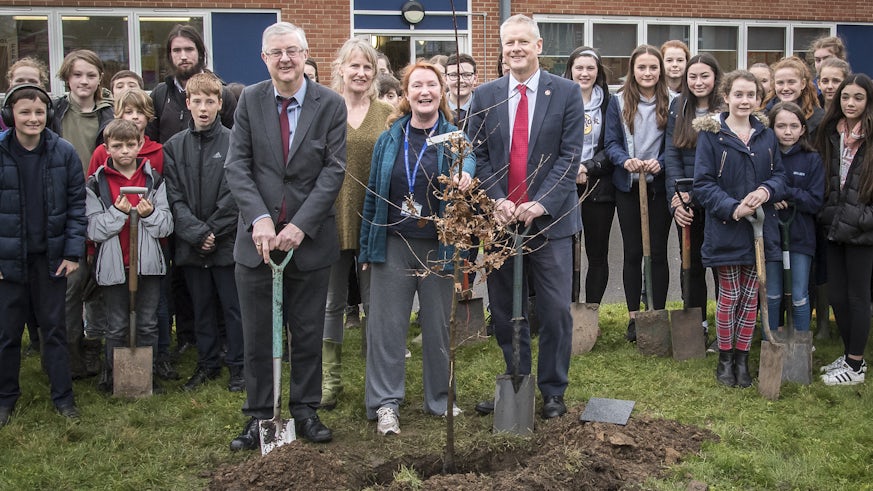Cardiff University project launches schools’ tree-planting initiative in Wales and Namibia
13 January 2020

A project which aims to plant trees at as many schools as possible across Wales and Namibia was launched today in Cardiff.
Phoenix Trees for Schools Wales launched with a tree-planting ceremony at Ysgol Gyfun Gymraeg Glantaf, attended by Cardiff University Vice-Chancellor Professor Colin Riordan and First Minister Mark Drakeford.
The tree-planting programme is being initiated and led by the Phoenix Project, a collaboration between Cardiff University and the University of Namibia to improve health, reduce poverty and develop a sensitive and sustainable approach to the environment.
Project lead Professor Judith Hall said a sustainability fund had been established five years ago to recognise the consequences of international travel involved in the project and Cardiff University’s commitment to carbon-responsible behaviour.
“This initiative is needed as environments in both Wales and Namibia are being threatened; we’re seeing the loss of native Welsh woodland and an increasing desertification in Namibia,” said Professor Hall, from the University’s School of Medicine.

As a true collaboration, what we do in Namibia we must also do in Wales - both countries must benefit. We're giving students an opportunity, not just to protest about climate change, but to make a real difference.
The launch was also attended by pupils from the school’s environment club and teacher Dr Anna Henderson, the club’s staff lead.
Dr Henderson said: “I’m delighted to be able to help empower the pupils of Glantaf to take action to tackle climate change and the very real, immediate threat posed to our biodiversity.
“Many feel passionately about environmental issues but powerless to take meaningful, preventative action on a personal level. They understand as well as anyone how great the impacts of our societal actions are, and the scale of change required in order to turn things around.”
Year 10 pupil Gwen Evans said: “I think it's important to raise awareness about the problems we face today as well as trying to lessen our contribution to global warming as a school.
“Through this tree-planting event I believe we are taking a step in the right direction to the reduction of carbon emissions in Wales.”
And Carys Reardon-Smith, also a year 10 pupil, said: “I feel very fortunate to be able to take part in doing something to tackle the current climate crisis.
“Working with the Phoenix Project has allowed us to have a voice and help less fortunate people, while also being able to take positive action for the planet.”
Professor Riordan said: “Through the Phoenix Project we are working together - schools and universities, across continents - to make the world a better place.”
The world will be a better place if we care for its future. Planting trees and working across borders will help to tackle climate change and improve biodiversity here in Wales and in Nambia and it shows the students of Glantaf how they can make a real difference.
The Phoenix Project is working with schools in both countries and with the Gwent Wildlife Trust who will lead wider planting initiatives in locations outside schools.
Tree planting has already begun in Namibia and the project also aims to plant trees in Zambia, where the Phoenix Project has recently started working.
The Phoenix Project covers a wide diversity of projects, all impact driven in response to the requirements of the United Nations Sustainable Development Goals.
Since its launch in 2014, it has developed more than 40 joint projects in Namibia, Zambia and Wales, including training the first professional anaesthetists; training doctors, nurses and midwives; making road safety initiatives; supporting local languages, improving human rights awareness and working in water security and the environment.



